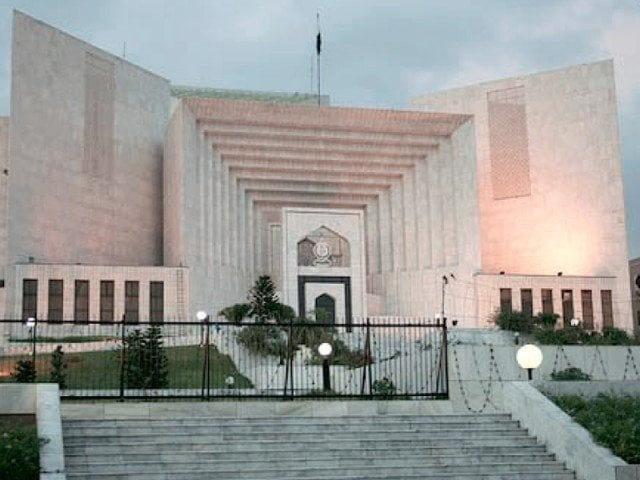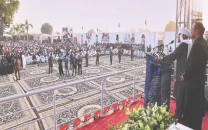Sharifs were denied due process in Hudabiya case: SC
Top court issues detailed verdict on NAB appeal to re-open case

PHOTO: FILE PHOTO
The three-judge bench, headed by Justice Mushir Alam and also comprising Justice Qazi Faez Isa and Justice Mazhar Alam Khan Miankhel, issued a 36-page detailed judgment on the dismissal of appeal by the National Accountability Bureau (NAB) regarding the restoration of the Hudabiya reference against Sharif family members, including Punjab Chief Minister Shehbaz Sharif.
In 2014, the Lahore High Court had quashed the reference against the Sharif family. The SC maintained the high court’s order.
SC dismisses NAB's appeal to reopen Hudaibiya Mills case against Sharifs
“We have come to the painful conclusion that respondents 1 through 9 (all Sharif family members) were denied due process. The legal process was abused, by keeping the reference pending indefinitely and unreasonably. The said respondents were denied the right to vindicate themselves. The reference served no purpose but to oppress them. We have also noted with grave concern the lack of commitment and earnestness on the part of NAB at the relevant time. NAB did not produce the accused in court… seek to have charges framed against them… examine a single witness [or] tender evidence,” says the judgment authored by Justice Isa.
Legal wizards have begun comparing the Hudabiya verdict with the Panama Papers ruling.
There is a clear diversion in judges’ approaches in both cases. During the hearing of the Panama case, the five-judge larger bench repeatedly observed that the Rs1.2 billion Hudabiya scam is still unaccounted-for due to NAB’s failure to file an appeal.
When former NAB chairman Qamar Zaman Chaudhry said that he stood by his earlier decision for not filing an appeal, one member of the larger bench observed that ‘NAB has died today’.
NAB appointment must for Hudabiya review plea
Even Justice Asif Saeed Khosa in his 192-page judgment observed that the soundness of the high court’s reasoning for quashing the reference was suspect. However, the recent judgment has backed the LHC’s reasoning.
Legal experts said the recent verdict has boosted the narrative of former prime minister Nawaz Sharif that accountability against politicians has been misused for political purposes.
Pakistan Bar Council member Raheel Kamran Sheikh believes that the two verdicts reflect two different realities in Pakistan, adding that the Panama verdict highlights the perspective of corruption in the political elite and how they use state machinery to their advantage, while the Hudabiya case judgment depicts the other reality of how accountability has been historically used for political engineering by non-democratic powers.
The PTI’s legal team member is mulling the interpretation of criminal laws as it believes that any lacunas open the door for a review.
Unfair to reopen Hudabiya Paper Mills scam case against Sharifs: Saad Rafique
The judgment said that the judges of the high court were justified to quash the reference and once it was quashed the question of reinvestigation did not arise, adding that fortuitously for the NAB, one judge permitted reinvestigation, even though the NAB had not requested it.
The SC also said that the LHC judge gave no reason why he permitted reinvestigation.
The court noted that the references also do not mention the ingredients which constitute the offences as they do not allege that Sharif family had assets “disproportionate” to their “known sources of income” which they could not “reasonably account for”, or had misused their “authority to gain any benefit or favour for himself or any other person.
The judgment also questions the findings of the JIT in the Panama case that additional foreign currency accounts have been unearthed by the JIT.
Rs1.24bn scam: Hudabiya case resurrected to haunt Sharifs
“If this is so, it cannot be categorised as fresh material, because such evidence was already in NAB’s possession. As regards that JIT had ‘recommended that NAB may be ordered to file an appeal’ is worrisome. NAB is a statutory body and is expected to act independently; it should not have foregone its independence to act at the behest of the JIT. With regards to the learned judges’ purported ‘non-serious working,’ this cryptic allegation is not supported by a single fact. Therefore, to make such an allegation is utterly inappropriate and verges on contempt,” it adds.
The judgment also notes that the “JIT’s report refers to ‘money laundering’ that took place in 1991 and 1992. However, money laundering was [not]made an offence in Pakistan [until September 7, 2007,] when the Anti-Money Laundering Ordinance was enacted... Additionally, a money laundering case is to be tried by a sessions court, and not by an accountability court, under the NAB Ordinance,” says the order.
Justice Isa, while referring to several articles of the constitution, observed that a person cannot indefinitely await the pleasure of a prosecuting agency to prosecute him. “If this is allowed prosecution becomes persecution, and persecution (or oppression) is worse than death.”
Panamagate case: SC gets first progress report from NAB
The judgment further said that a reference filed under the NAB Ordinance should mention the offence and also set out the particulars of the offence as “this enables the court to frame a charge and puts the accused on notice with regard to the allegation he is supposed to defend”.
The court was surprised to learn that no charge was ever framed against the Sharifs. Likewise, the record of the accountability court reveals that they were never produced before the court, or exempted from appearing.
The judgment was also critical of the accountability court being set up in Attock Fort, which was under the control of the military and to which there was no public access.
The SC also endorsed the LHC’s discarding of former finance minister Ishaq Dar’s confession regarding his involvement in money laundering, as the law at the time did not allow for it. “The NAB Ordinance was amended on July 5, 2000, to enable a statement to be recorded by a Magistrate.”
Reopening of Hudabiya case recommended
To enable a statement recorded under section 164 of the Code to be used against an accused, the SC noted that it must be recorded in the presence of the accused, and the accused given an opportunity of cross-examining the witness making the statement.
The judgment also raised serious questions on the exile agreement between Musharraf and the Sharifs in 2002.
The court also made it clear that in any event, the state and those who have physical custody of an accused are responsible for producing them in court and cannot exile him.
It said that Sharif brothers could not exile themselves, adding that the person or persons who had exiled them would be deemed to have compromised, hampered, jeopardised, or defeated the legal process, but NAB did not move against anybody.
NAB’s probe exposed Sharifs' corruption in Hudabiya scam, docs reveal
The court also noted that the NAB moved petition 1,229 days late.
The judgment also said that during the hearing of the case, most of the media acted maturely and reported fairly on the proceedings, but there were some who violated the parameters of factual reporting and also broadcast and printed views of persons who were interested in a particular outcome of this case.
“The media should not dilate on a sub judice case, rather should only accurately report the proceedings. Once a judgment is announced, it may be analyzed, evaluated or critiqued.”



















COMMENTS
Comments are moderated and generally will be posted if they are on-topic and not abusive.
For more information, please see our Comments FAQ